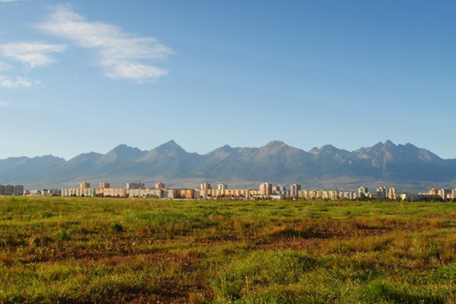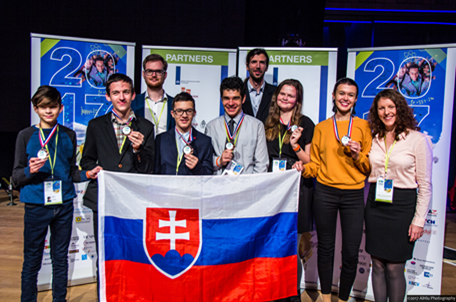
Katarina Kmetova, MSc is an International Visiting Scholar who is working on a 6-month internship in the Knight Lab. Katarina studied biomedical physics at Comenius University in Bratislava, where she received her bachelor's and master's degrees.
Learn more about Katarina Kmetova
Where are you from?

I come from a tiny country in the middle of Europe, called Slovakia (not Slovenia, we are a bit sensitive about that). You might remember us as Czechoslovakia from a few years ago. I come from a lovely town of Poprad, located under the Tatra mountains. My hometown is known for tourism, because of the beautiful mountain views. It is a popular destination for hiking in the summer and skiing in winter. You can see the tops of the buildings in my hometown and the Tatra mountains in the picture to the right.
Tell us about your education.

For my bachelor's and master's degrees, I studied biomedical physics at Comenius University in Bratislava, Slovakia. This program is focused on the study of medicine in combination with more technical knowledge of mathematics and physics. During my studies, I got more interested in medicine and decided to pursue a scientific career in biomedicine at the Institute of Molecular Biomedicine at the same university. I am now very excited to be doing a 6-month internship in the Knight lab!
Back home, my main project is studying the effects of caffeine on immunity. My research has focused on the activity of neutrophils in vitro and in mouse models of inflammatory diseases. There is evidence that the receptors binding caffeine in the body affect the activity of immune cells. This implies that caffeine also has an immunomodulatory effect, but what fascinates me is that we don't really know that much about it.
What interests you about antiphospholipid syndrome?
There is no cure for APS - all we can do is treat its symptoms. This leaves a gap that needs to be filled with science. I believe that learning more about the pathophysiology and molecular mechanisms in APS will help us find a cure, and APS patients will then not have to take anticoagulant medication for the rest of their lives.
Also, I have a friend suffering from APS back in Slovakia and it took doctors many months to diagnose him. I believe spreading the knowledge about APS is important and will improve the lives of many people.
What do you see yourself doing in the future?
I would like to pursue a career in science. I would like to learn more, and one day lead my own research group. I think that the dream of any scientist in biomedicine is to contribute to the current knowledge and improve the lives of people. I don't have a clear path in my head right now. I think I still have a lot to learn before I choose it.
What is something you enjoy doing outside of work?
I love nature and besides the Tatra mountains, there are a lot of beautiful parks in Slovakia. I love to go hiking. I also like to spend time with my friends and recently I started to learn to dance Lindy hop. To relax from everyday worries, I like to turn my brain off with yoga. My ideal situation is some combination of those!



